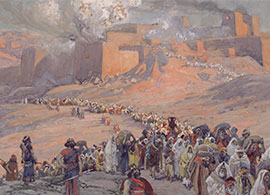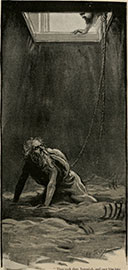Jeremiah Week 10
Solidarity in Suffering
Professor of Theology, Loyola University Maryland
Read this week’s Scripture: Jeremiah 34:1–41:10
17:54

 Enlarge
Enlarge
If you have ever been in a long, intense argument with someone, you know how satisfying it is when it becomes clear that you were right all along. Jeremiah gets a taste of that in this week’s lesson. The word of the LORD finally comes to pass. Jerusalem falls and the Babylonians take over. The destruction is terrifying and the suffering is immense. After months of mistreatment at the hands of Jerusalem’s political powers, Jeremiah turns out to have been right. He takes no pleasure in this, however. Unlike his fellow Judeans, the Babylonians are well disposed to Jeremiah. They offer him a number of potentially pleasant options. Instead, Jeremiah decides to stay with his people. Now, more than ever, they will need him, and he will stand with them.
The Infidelity of Jerusalem
This week’s lesson begins with a difficult text. Jeremiah 34:1−7 seems to contain a straightforward contradiction. Chapter 34 is set in Jerusalem during the siege. Jeremiah brings a word from the LORD to Zedekiah, the king, when things seem to be at their bleakest (Jeremiah 34:6−7). In verses 2 and 3, God promises to hand Zedekiah over to Nebuchadnezzar. He will go into exile in Babylon. But in verses 4 and 5, another word from the LORD asserts that Zedekiah will die peacefully in Jerusalem and be mourned in a manner proper to a king.
Scholars account for this in a variety of ways. The most plausible is to treat the words in verses 4 and 5 as conditional: if Zedekiah hears the word of the LORD, which would include appropriate forms of repentance, then he will die in peace in Jerusalem.
This way of treating these verses makes most sense if they are read in the light of the two accounts that follow in Jeremiah 34:8−22 and 35:1−19. The first passage tells a story of remarkably bad faith. At the king’s behest, the besieged inhabitants of Jerusalem all agree to release their Hebrew slaves. These would have been debt slaves, those too poor to meet their financial obligations. This seems to be a belated attempt to obey the commands of Exodus 21:1−6 and Deuteronomy 15:1−11 under the compulsion of extreme circumstances. Regardless of the motives behind this decision, we read in Jeremiah 34:11 that the people changed their minds and re-enslaved those whom they had just released.
The statement in verse 21 that the Babylonians had withdrawn from Jerusalem refers to the Babylonian invasion of 589 BCE, which was briefly halted and then resumed in 587 BCE. This withdrawal may have created the false sense of relief that led the people of Jerusalem to renege on their covenant.
In response, the LORD approves of the release of the slaves as a belated attempt at Torah obedience (Jeremiah 34:15). However, because the “covenant” the people made to release their slaves was sworn in the Temple, God feels particularly affronted by their reversal. Their actions have not only broken God’s commands, but have profaned God’s name (Jeremiah 34:16). Therefore, just as the people of Jerusalem released their slaves, God will “release” them (Jeremiah 34:17). In this case, God will release them to destruction. They will be utterly defeated. The next verses play on the word “cut.” In Genesis 15:7−11, the cutting of animals into two pieces is part of a ritual of solidarity. Here in Jeremiah, it is the officials of Judah and Jerusalem who will be cut and left as food for wild animals and birds. As for Zedekiah, he and his officials will be handed over to Nebuchadnezzar.
The Fidelity of the Rechabites
Chapter 35 relates a story from an earlier time, when Jehoiakim was king. The LORD commands Jeremiah to gather the Rechabites into the Temple. There, he is to try to get them to drink wine. The Rechabites neither drink wine, nor own land or vineyards. They live in tents. They have only come to Jerusalem to escape the Babylonian advance.
When offered wine by Jeremiah, they refuse, keeping their commitments to their founder, Jonadab. This fidelity allows Jeremiah to contrast these Rechabites, who have remained faithful to their commitments, with the people of Judah, who have repeatedly ignored or violated their commitments to the LORD, even in the face of repeated calls from the prophets to repent. Thus, even though Judah will face disaster, the Rechabites will be maintained by God.
The story of the freeing and then re-enslaving of the slaves of Jerusalem along with this story of the Rechabites provide examples of the two options presented to Zedekiah in Jeremiah 34:2−3 and 4−5. The first is a story of failed integrity resulting in even deeper infidelity. The other shows that God sustains those who remain faithful to their commitments.
The Burned Scroll
Chapter 36 continues during the reign of Jehoiakim. As in chapter 30, Jeremiah is commanded to write down the words he received from the LORD on a scroll. Unlike chapters 30 and 31, these are words of judgment and imminent disaster. God hopes these words will have some deterrent effect and lead the people to repent.
At this point in his ministry, Jeremiah is unwelcome in the Temple, so he sends Baruch the scribe, one of his allies. The scroll is composed and then Baruch reads it in the Temple on a holy day, at a time designed to give the word of the LORD a large audience (Jeremiah 36:9−10). The aim is to induce the people to repent.
Instead, we learn that the message of Baruch’s scroll works its way up the bureaucratic chain of command until it is finally read to Jehoiakim. The king demonstrates his contempt for Baruch, Jeremiah, and their message from God by burning the scroll piece by piece. The text poignantly relates that the king and his advisors neither tore their clothes nor showed any fear in the face of this message designed to do just that (Jeremiah 36:24). Rather, the king orders the arrest of Baruch and Jeremiah.
The LORD hides both men and instructs them to write a new scroll to replace the one Jehoiakim burned. This version contains a direct judgment of Jehoiakim, promising death and disaster to him and his household (Jeremiah 36:27−32).
Jeremiah Imprisoned by Zedekiah
As chapter 37 begins, we learn that Zedekiah ultimately comes to sit on the throne. Nebuchadnezzar establishes Zedekiah as king, but then Zedekiah rebels against his Babylonian masters. The Babylonians come to restore their claim on Jerusalem. The Babylonians have the city under siege when Egypt, the superpower to the south, begins to march toward them. This causes the Babylonians to abandon their siege for the time being. Zedekiah is now faced with a series of political decisions. In Jeremiah 37:2, we learn that to this point, Zedekiah and all his advisors ignored the words of the LORD that came through Jeremiah. In the light of these new circumstances, however, Zedekiah sends emissaries to Jeremiah, asking him to pray to God for guidance (Jeremiah 37:3). The word from the LORD is unequivocal. The Babylonians will be back, and they will take the city. All that is happening now is a brief respite.
During the respite following the withdrawal of the Babylonian forces, Jeremiah tries to return to his hometown to take care of family business. At the gate to the city, he is arrested. Jeremiah is accused of trying to defect to the Babylonians. Despite his protests of innocence, he is beaten and jailed.
After “a long time” (Jeremiah 37:16), the king sends for him and asks if he has heard any word from the LORD. Perhaps Zedekiah thought that a sufficient amount of time in prison would soften Jeremiah’s message. He does not seem to grasp the possibility that Jeremiah’s message might be something more than Jeremiah’s own vision of things. The idea the God might actually be speaking through Jeremiah seems inconceivable to Zedekiah. Jeremiah gives a brief message, summarizing all that he has been saying: Zedekiah will be handed over to the Babylonians.
At this point Jeremiah does insert himself into the dialogue (Jeremiah 37:20). He asks Zedekiah not to return him to prison. He claims that he will die there if he returns. As awful and corrupt as our contemporary habits of incarceration are, it is also important to remember that in the ancient world, prison was not a place designed for rehabilitation. It was designed to punish, break, and ultimately eliminate those who ended up there. The conditions would have been horrific. Jeremiah plaintively asks why those “prophets” who claimed that the Babylonians would never attack Jerusalem had not also been put in prison. They had clearly been wrong, whereas Jeremiah has been correct. The king offers a modest concession. Jeremiah will be held in the court of the guard rather than in prison and receive a daily ration of bread. He does not set Jeremiah free, however.
Jeremiah in the Cistern

 Enlarge
Enlarge
Jeremiah’s fortunes take another turn for the worse in chapter 38. A faction led by Shephatiah, Gedaliah, Jucal, and Pashhur incite the king to re-imprison Jeremiah. They have heard Jeremiah’s prophetic advice that those who surrender to the Babylonians shall live and those who stay in the city will die. They note that this message is quite discouraging to the soldiers and others who remain in the city. In effect, Jeremiah is charged with undermining the morale of the people. His accusers advocate death for Jeremiah, The king claims to be powerless against these men and hands Jeremiah over to them (Jeremiah 38:5). His actions here are reminiscent of Pilate. Zedekiah neither agrees with those who accuse Jeremiah, nor does he act to save Jeremiah. As a result, Jeremiah is cast into a muddy, waterless cistern where he will surely die unless he gets some help.
Help comes in the form of one of the king’s servants, Ebed-melech. He prevails upon the king to help Jeremiah. The king, who just agreed to hand Jeremiah over to his accusers, now agrees to help Jeremiah. He is lifted out of the cistern and “remains in the court of the guard,” which is where chapter 37 ends.
The Foretold Destruction Finally Occurs
We learn of one final conversation between Zedekiah and Jeremiah in the latter part of chapter 38. The despairing king asks meets with Jeremiah in private. Jeremiah hesitates to answer the king’s questions, since he knows that the word of the LORD will not please Zedekiah and Jeremiah does not want Zedekiah to take that out on him (Jeremiah 38:15). Zedekiah promises not to “kill the messenger” (Jeremiah 38:16). The news from Jeremiah is neither new nor pleasing to the king. If Zedekiah surrenders, he will save himself and the city. If he resists, he will die and the city will be destroyed. In Jeremiah 38:14−28, we see that Zedekiah is a man torn between several opposing factions. If he surrenders, he will anger the pro-resistance group that has been so hostile to Jeremiah in chapters 37−38. He is further afraid that he may be handed over to the pro-Babylonian Judeans, already in Nebuchadnezzar’s camp. That would also be risky. In addition, he seems persuaded by elements of Jeremiah’s prophetic insights. Nevertheless, he does not trust the LORD to protect him. In the end, all he and Jeremiah can do is agree to deny that their conversation ever took place (Jeremiah 38:24−28).
After a siege of roughly 18 months (2 Kings 25:1−7), we read in Jeremiah 39 that the Babylonians finally take Jerusalem. Zedekiah tries to escape, but is captured. Things play out as the LORD declared through Jeremiah. Zedekiah’s family is slaughtered before his eyes. His eyes are then gouged out. Those who seem most useful to the Babylonians are taken away into exile. The city is torched. The poor are left behind and given some land to work (Jeremiah 39:1−10). Just 10 verses narrate the events that the LORD described through Jeremiah in terrifying detail throughout the earlier chapters of the book.
Abiding with the Remnant
The Babylonians hand Jeremiah over to Gedaliah for safekeeping. It would appear that Nebuchadnezzar knows of Jeremiah and sees him as favorably disposed to Babylonian interests. He seeks to provide security for Jeremiah. In some respects, this confirms the view of the anti-Babylonian group who saw Jeremiah as a traitor. The text says nothing about this. Instead, it simply notes that Jeremiah “remained with his own people” (Jeremiah 39:14). Perhaps this is a way of asserting Jeremiah’s solidarity with the people. He gets no particular benefit and certainly no joy from seeing a Babylonian victory. Instead, he abides with those who remain.
Almost as an afterthought, a word from the LORD comes to Jeremiah confirming that Ebed-melech, the servant who secured Jeremiah’s release from the cistern in chapter 38, will be protected from the Babylonians “because you have trusted in me, says the LORD” (Jeremiah 39:18).
As chapter 40 begins, a Babylonian official narrates the basic plot of this book for Jeremiah: The people sinned against the LORD. Therefore, the LORD has used the Babylonians to bring judgment upon Judah. The information is not new, but to have it so clearly laid out by a Babylonian must have appeared as a deep irony to Jeremiah and to subsequent readers. Sometimes those outside of the community of believers have a much clearer insight into the ways of God.
Be that as it may, this Babylonian official offers Jeremiah a choice to go wherever he pleases: He can return to Babylon with the official and be well looked after. He can stay behind and be taken care of. He can go somewhere else if that seems good to him. In the end, Jeremiah stays and joins himself to Gedaliah, who is in charge of governing the remnant of Judah (Jeremiah 40:6).
Gedaliah
Like all rulers appointed by an occupying power, Gedaliah’s position is tense. He stands between Babylon, on the one hand, and the people of Judah, on the other hand. Moreover, the Judeans themselves seem divided about how to respond to the fall of Jerusalem.
Interestingly, Gedaliah describes his own role as representing the Judeans to the Babylonians and not the other way around (Jeremiah 40:10). He is their advocate, not Babylon’s instrument. Gedaliah’s proposal to the Judeans is similar to the recommendation Jeremiah offered those in exile in Babylon (Jeremiah 29:1−7). That is, seek the peace and welfare of the place where God has put you. Build, plant, and pray, waiting for the LORD’s direction (Jeremiah 40:7−12).
Gedaliah must understand that he has enemies, both among the Judeans and among neighboring states. He learns from his ally Johanan that the Ammonite king has sent Ishmael, who is from the deposed Judean royal family (Jeremiah 41:1), to assassinate Gedaliah. Gedaliah does not believe this report (Jeremiah 40:16).
This turns out to have been unwise. What is worse is that Gedaliah receives Ishmael as a guest, eating bread with him (Jeremiah 41:1). In what must be seen as a disgraceful and cowardly abuse of hospitality, Ishmael kills Gedaliah and those with him. To add to his crimes, Ishmael slaughters a group of pilgrims from the north who have come to mourn the fall of Jerusalem (Jeremiah 41:4−10).
This section of Jeremiah has covered the situation immediately leading to Zedekiah’s demise and the fall of Jerusalem and the promising but brief provisional government of Gedaliah. This all happens precisely as the LORD spoke through Jeremiah. Throughout these chapters, Jeremiah suffers the repercussions for prophesying the imminent fall of Jerusalem. Nevertheless, he remains faithful to his vocation. Moreover, when he is given the opportunity to retire to Babylon and be well cared for, he opts to “remain with his people.” These chapters reflect God’s fidelity to God’s promises regarding Judah, and Jeremiah’s dual fidelity to his mission to speak the word of the LORD and to stand with the people of Judah in their darkest hour.
Questions for Further Discussion
- What motivates Jehoiakim, Zedekiah, those with Shephetiah, and others, to oppose Jeremiah? Why is it so compelling to ignore or silence such a prophet? If you were Jeremiah, how would you respond to these persecutions?
- Though Jeremiah has many enemies, he also has friends (some unexpected!) who help him or treat him well: Baruch, Ebed-Melech, Zedekiah (sometimes), Gedaliah, the Babylonian officials. How do these friends help Jeremiah at key moments? What do you think motivates them to aid Jeremiah?
- The siege, destruction, and exile of Jerusalem is a traumatic event for God’s people. How does such a cataclysmic event align with God’s plan for the restoration of Israel and Judah?
- Why do you think Jeremiah choose to remain with his people? What evidence from the text supports your view?
<<Previous Lectio Back to Jeremiah Next Lectio>>

This work is licensed under a Creative Commons License.





In a nation in which the evangelical community has wrapped itself in the flag, Jeremiah’s prophetic voice is needed. Imagine proclaiming surrender as God’s will for the nation, especially counter to the establishment religious voices. Thank you, Jeremiah, for being a corrective to the rah-rah patriotism which seems rampant in many churches.